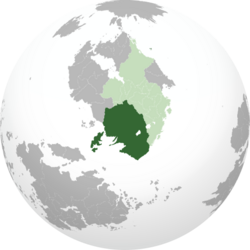Lapody: Difference between revisions
| Line 73: | Line 73: | ||
===Pre-union states=== | ===Pre-union states=== | ||
====Loreseia==== | ====Loreseia==== | ||
The Grand Duchy of Loreseia was established out of the largely intact Loreseian Duchies, whose ruling house (Guovia) survived the [[Second Great War]] and [[Third Fratricide]] still in control, albeit with many concessions to democratic reform factions. The Loreseian Duchies were, accordingly, consolidated at the conclusion of the Fratricide to form a coherent nation. It was one of the only monarchies in the [[Deric States]] and the only surviving monarchy in Lapody. | |||
====Verecundia==== | ====Verecundia==== | ||
====Vorenia==== | ====Vorenia==== | ||
Revision as of 13:53, 6 January 2023
This article is a work-in-progress because it is incomplete and pending further input from an author. Note: The contents of this article are not considered canonical and may be inaccurate. Please comment on this article's talk page to share your input, comments and questions. |
This article or section contains future lore that is not canon yet - but someday might be. Stay tuned. |
Kingdom of Lapody Regna Lapoda (Lapodard) | |
|---|---|
Motto: Your motto, often in another language ("Your motto in English") | |
Anthem: Your song | |
 Location of XXX (dark green) In XXX (gray) | |
| Capital and largest city | Albiga |
| Official languages | Lapodard |
| Religion | Catholic Church |
| Demonym(s) | Lapodard Lapods (plural) |
| Government | Constitutional monarchy |
• King | Joseph I |
• Your head of government if applicable, otherwise a legislative leader | Jane Blow |
• A legislative leader of a different house, if applicable | Georgw Blow |
| Your upper house | |
| Your lower house | |
| Establishment | |
• Formed | 2030 |
| Population | |
• Estimate | 169,069,937 |
| GDP (nominal) | estimate |
• Total | $6,905,932,664,611 |
• Per capita | $40,846.60 |
| Currency | Taler |
Lapody, officially the Kingdom of Lapody, is a country in Levantia. It is neighbored by Rhotia and Urcea to the west and Burgundie to the east. It also borders the League of Nations territory of Alba Concordia.
Lapody is a member of the Levantine Union.
Etymology
"Lapody", derived from "Lapodia", has been in use since antiquity in wide application. The easternmost coastal province of Great Levantia was called "Lapodia Maritima". The province, which encompassed roughly far northern Burgundie and eastern Lapody, was likely named for a tribe of paleo-Levantines living in the region in the 2nd century BC. "Lapodard", the name of the language, is derived from Lapodia/Lapody. The term was also breifly use in some sources to refer to the Eastern Kingdom of the Levantines as a shorthand before "Dericania" entered common use. Lapody as a geographical term fell into sharp decline in the 13th century, being largely survived only by the derivative "Lapodard" name. It was revived in the 20th century as a shorthand to refer to the southern three Deric States.
Geography
History
Pre-union states
Loreseia
The Grand Duchy of Loreseia was established out of the largely intact Loreseian Duchies, whose ruling house (Guovia) survived the Second Great War and Third Fratricide still in control, albeit with many concessions to democratic reform factions. The Loreseian Duchies were, accordingly, consolidated at the conclusion of the Fratricide to form a coherent nation. It was one of the only monarchies in the Deric States and the only surviving monarchy in Lapody.
Verecundia
Vorenia
The Federal Margraviate of Vorenia, also known as the Marchiorespublica, was established out of several preexisting Derian polities after the Second Great War in an effort to contain Burgundie. It was the largest of the Deric States.
Lapodard unification
Government
Lapody is a unitary constitutional hereditary monarchy and is largely based on some similar constitutional monarchies of its predecessors in the Deric States. The head of state is the King. Upon formation of the Kingdom of Lapody, two of the three states which joined were republics, and consequently the Grand Duke of Loreseia was elevated as King of the country following a period of negotiations. The King of Lapody's role in government is relatively limited, both in part due to Loreseian traditions and due to the agreement which established the Kingdom. Analysts have called the Lapodian monarch the "weakest in the Levantine Union", serving primarily as a figurehead operating only on constitutional advice from the elected goverment.


